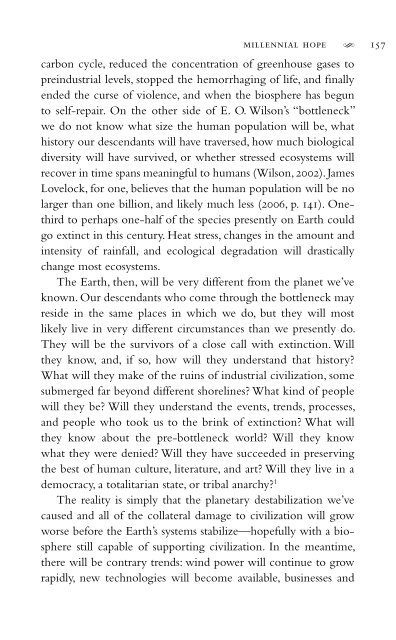Down to the wire : confronting climate collapse / David - Index of
Down to the wire : confronting climate collapse / David - Index of
Down to the wire : confronting climate collapse / David - Index of
You also want an ePaper? Increase the reach of your titles
YUMPU automatically turns print PDFs into web optimized ePapers that Google loves.
millennial hope S 157<br />
carbon cycle, reduced <strong>the</strong> concentration <strong>of</strong> greenhouse gases <strong>to</strong><br />
preindustrial levels, s<strong>to</strong>pped <strong>the</strong> hemorrhaging <strong>of</strong> life, and fi nally<br />
ended <strong>the</strong> curse <strong>of</strong> violence, and when <strong>the</strong> biosphere has begun<br />
<strong>to</strong> self-repair. On <strong>the</strong> o<strong>the</strong>r side <strong>of</strong> E. O. Wilson’s “bottleneck”<br />
we do not know what size <strong>the</strong> human population will be, what<br />
his<strong>to</strong>ry our descendants will have traversed, how much biological<br />
diversity will have survived, or whe<strong>the</strong>r stressed ecosystems will<br />
recover in time spans meaningful <strong>to</strong> humans (Wilson, 2002). James<br />
Lovelock, for one, believes that <strong>the</strong> human population will be no<br />
larger than one billion, and likely much less (2006, p. 141). Onethird<br />
<strong>to</strong> perhaps one-half <strong>of</strong> <strong>the</strong> species presently on Earth could<br />
go extinct in this century. Heat stress, changes in <strong>the</strong> amount and<br />
intensity <strong>of</strong> rainfall, and ecological degradation will drastically<br />
change most ecosystems.<br />
The Earth, <strong>the</strong>n, will be very different from <strong>the</strong> planet we’ve<br />
known. Our descendants who come through <strong>the</strong> bottleneck may<br />
reside in <strong>the</strong> same places in which we do, but <strong>the</strong>y will most<br />
likely live in very different circumstances than we presently do.<br />
They will be <strong>the</strong> survivors <strong>of</strong> a close call with extinction. Will<br />
<strong>the</strong>y know, and, if so, how will <strong>the</strong>y understand that his<strong>to</strong>ry?<br />
What will <strong>the</strong>y make <strong>of</strong> <strong>the</strong> ruins <strong>of</strong> industrial civilization, some<br />
submerged far beyond different shorelines? What kind <strong>of</strong> people<br />
will <strong>the</strong>y be? Will <strong>the</strong>y understand <strong>the</strong> events, trends, processes,<br />
and people who <strong>to</strong>ok us <strong>to</strong> <strong>the</strong> brink <strong>of</strong> extinction? What will<br />
<strong>the</strong>y know about <strong>the</strong> pre-bottleneck world? Will <strong>the</strong>y know<br />
what <strong>the</strong>y were denied? Will <strong>the</strong>y have succeeded in preserving<br />
<strong>the</strong> best <strong>of</strong> human culture, literature, and art? Will <strong>the</strong>y live in a<br />
democracy, a <strong>to</strong>talitarian state, or tribal anarchy? 1<br />
The reality is simply that <strong>the</strong> planetary destabilization we’ve<br />
caused and all <strong>of</strong> <strong>the</strong> collateral damage <strong>to</strong> civilization will grow<br />
worse before <strong>the</strong> Earth’s systems stabilize—hopefully with a biosphere<br />
still capable <strong>of</strong> supporting civilization. In <strong>the</strong> meantime,<br />
<strong>the</strong>re will be contrary trends: wind power will continue <strong>to</strong> grow<br />
rapidly, new technologies will become available, businesses and
















